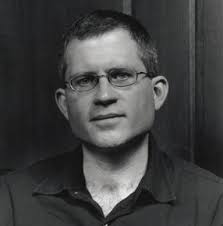
The January 2020 issue of Poetry opens with three Christian Wiman poems, the third, “Even Bees Know What Zero Is,” being a prime example of what Tony Hoagland heralded as voice breaking all the rules because it can.
This is poetry dotted with throwaway phrases like “Which reminds me,” “come to think of it,” and “by the way.” Your high school poetry teacher would have fits, but hey, if an established poet (and one-time editor of Poetry magazine, for you conspiracy theorists) can play fast and loose with language (not to mention libraries and the Dewey Decimal system), you can too.
It all ends with a playful series of metaphors and a play on the poet’s name. This after a conversational style studded with all manner of sound devices. It’s the type of poem that beguiles some and horrifies others, depending on your poetic affiliation. See where you fall:
Even Bees Know What Zero Is
Christian Wiman
That’s enough memories, thank you, I’m stuffed.
I’ll need a memory vomitorium if this goes on.
How much attention can one man have?
Which reminds me: once I let the gas go on flowing
after my car was full and watched it spill its smell
(and potential hell) all over the ground around me.
I had to pay for that, and in currency quite other than attention.
I’ve had my fill of truth, too, come to think of it.
It’s all smeary in me, I’m like a waterlogged Bible:
enough with the aborted prophecies and garbled laws,
ancient texts holey as a teen’s jeans, begone begats!
Live long enough, and you can’t tell what’s resignation, what resolve.
That’s the bad news. The good news? You don’t give a shit.
My life. It’s like a library that closes for a long, long time
—a lifetime, some of the disgrunts mutter—
and when it opens opens only to an improved confusion:
theology where poetry should be, psychology crammed with math.
And I’m all the regulars, searching for their sections
and I’m the detonated disciplines, too.
But most of all I’m the squat, smocked, bingo-winged woman
growing more granitic and less placable by the hour
as citizen after citizen blurts some version of
“What the hell!” or “I though you’d all died!”
and the little stamp she stamps on the flyleaf
to tell you when your next generic mystery is due
that thing goes stamp right on my very soul.
Which is one more thing I’m done with, by the way,
the whole concept of soul. Even bees know what zero is,
scientists have learned, which means bees know my soul.
I’m done, I tell you, I’m due, I’m Oblivion’s datebook.
I’m a sunburned earthworm, a mongoose’s milk tooth,
a pleasure tariff, yesterday’s headcheese, spiritual gristle.
I’m the Apocalypse’s popsicle. I’m a licked Christian.
